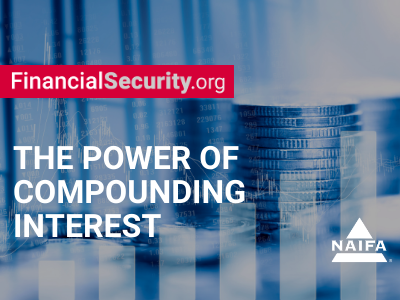When it comes to preparing for the future and retirement, nothing helps more than a healthy savings account. But what if your savings just doesn’t feel like it will be enough to cover future monthly expenses?
That is where the power of compounding interest comes in. Compound interest is a means of investment that makes your saved money grow just by existing in your account.
When the investment matures, you’re able to withdraw more money than you deposited thanks to the power of compound interest.
The formula for understanding the amount of compound interest you can earn with savings is complex — don’t worry, we have a calculator — and it looks like this:
A = P (1 + r/n) (nt)
- “A” stands for the end Amount after compound interest
- “P” is the Principal, or the amount of money you place into the account
- “r” is the actual interest Rate percentage
- “t” represents the amount of Time it will take for the investment to mature
- “n” represents the amount of times the interest will compound during “t”
For example, if you set up a Certificate of Deposit account — or CD — and place $5,000 in the account as principal and receive an interest rate of 4 percent that compounds monthly for a 3-year period, it would look like this:
A = $5,000(1 + .04/12) (12 x 3)
After three years of letting the money sit in the CD, the account matures to a total of $5,636.36. Thanks to compounding interest, you just made $636.36 without having to do anything and with almost no risk to your finances!
If you decide you want to continue earning compound interest (hint, you do), the only thing you need to do is renew your CD.
“Traditionally, if you’re a saver, compound (interest) is truly amazing to hedge volatility while saving,” says Dan Maloney, an investment advisor at Thurston Springer Financial in Indianapolis.
Saving money with less risk
In many forms of compound interest, such as CDs, the money is “locked,” so the bank can’t touch the money in your account and use it for anything else, which protects your savings from negative rates that can arise.
“Your CD has a rate of 2%, and the bank decides any CD interest rates are now negative. They can’t change your CD until it matures, and only if you try to extend it,” Maloney explains.
Depending on the type of account, the time period can range from 1 to 25 years. Although, Maloney recommends focusing on short-termed accounts.
“Generally speaking, there’s the rule of 72. If you put 72 in [an accounting] page. Each direction you push the decimal point, that’s how many years it takes to double your money,” he says.
“Short-term rates are held there because you have a project down the line (buying a house, etc.), so it’s a way to keep your money moving without being negatively affected. 3% with 5 years, for example. If your timeframe is 35 years, you don’t want to invest a lot of money that won’t gain much.”
Compound interest opens financial options
While compounding interest is frequently associated with Roth-IRAs and 401(k) accounts, these types of savings accounts aren’t the only way to earn compound interest.
“Roth-IRA is simply a non-taxable account; it’s not any one type of investment,” clarifies Gino Johnson, a partner at Peachin, Schwartz, and Weingardt. “It’s a mechanism … you can put a CD in your Roth.”
If you’re nearing retirement and haven’t set up savings with compound interest before, you might want to consider a few other options. Mutual Funds, bank savings accounts, and standard brokerage accounts all deal in compound interest, though some are riskier such as bonds.
Johnson advises that riskier bonds, such as corporate “junk” bonds may offer interest rates of 6% to 7%. The problem, however, is that these bonds are more volatile than a CD. “There is no guarantee the principal will stay there, if you reopen the account instead of keeping it locked,” Johnson says.
If you decide to stick with investment accounts, and you’ve decided on a bank or financial investment firm, don’t be discouraged by low interest rates.
“Generally, [negotiating rates] won’t happen with a bank.” Johnson says. “Shop around though, just because one bank has bad rates, it doesn’t mean others are the same.”
If you’re still unsure of where to start, Maloney recommends consulting a financial advisor. “They’ll want to know what your pension is. Do you have 401(k) options, what’s your financial picture? Then they can say, here’s what you need to do given your time frame.”
Saving slow and steady
Are there any practical drawbacks to relying financially on compound interest? Maloney says it’s a safer way to save money for retirement, but your income will grow more slowly than with a higher-risk investment.
“It’s a much safer and secure method to watch money, but it’s not going to grow as quickly [as you may need],” he says. “There is no real drawback, other than you may be choosing to forego more lucrative/riskier investments.”
Johnson agrees compounding interest needs to be part of a diversified financial portfolio. “It’s a good component, but you don’t want to use it as your entirety. A lot of products that are straight interest (e.g., equity mutual funds) offer rates that tend to be lower than what you need to live comfortably.
“(Compounding interest) should NOT be your primary, but absolutely a part of your financial planning,” he adds. “You have to make sure you’re clear on your plan forward, but diversify.”









